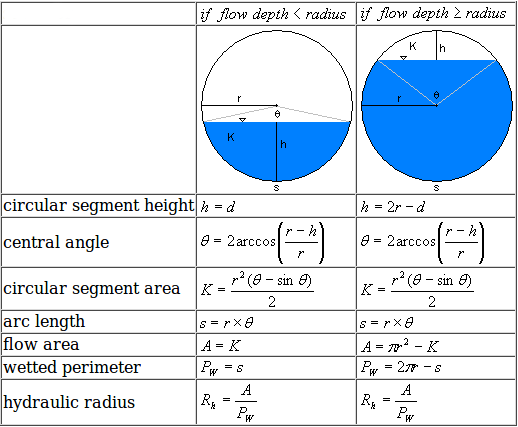Culvert formula (Water Overlay)
Revision as of 10:06, 15 April 2019 by Frank@tygron.nl (talk | contribs)
Flow through culverts is based on an open channel flow calculation.
The actual height of the culvert is at least the height of the terrain on either end of the culvert and the provided threshold height:
- Bc = max( Tc , Bl , Br )
The radius of the culvert:
- r = D / 2.
The height of the water column at either end of the culvert, relative to the culvert, is calculated:
- wl = max(0, wl - Bc)
- wr = max(0, wr - Bc)
Flow depth d is:
- d = max ( 0 , min ( D , max ( wl , wr ) - Bc ) ) )
The loss coefficient for the culvert is calculated:
- U = sqrt( 1 / ( 1 + 2 * g * n2 * length / Rh4/3 ) )
The potential flow through the culvert is then calculated:
- C = U * K * sqrt( 2 * g * abs( wl - wr ) )
Finally the actual amount of water flow is calculated:
- Δf = Δt * C / Δx
Where:
- D = The CULVERT_DIAMETER attribute of the culvert.
- Tc = The CULVERT_THRESHOLD attribute of the culvert.
- Bc = The surface height of the base of the culvert.
- wleft = The water level on the left side of the culvert, relative to datum.
- wright = The water level on the right side of the culvert, relative to datum.
- Rh = The hydraulic radius in the culvert[1].
- K = Flow area, based on the height of the water in the (circular) culvert.
- g = Acceleration factor of gravity
- L = The length of the culvert, calculated as the distance between the culvert's endpoints.
- U = Loss coefficient for culverts.
- n = The CULVERT_N attribute of the culvert.
- C = The potential rate of water flow through the culvert.
- Δf = The water flow which takes place.
- Δt = Computational timestep.
- Δx = Cell size.
See also
References
- ↑ Hydraulic Radius Equations Formulas Calculator ∙ found at: https://www.ajdesigner.com/phphydraulicradius/hydraulic_radius_equation_pipe.php ∙ (last visited 2019-02-11)
